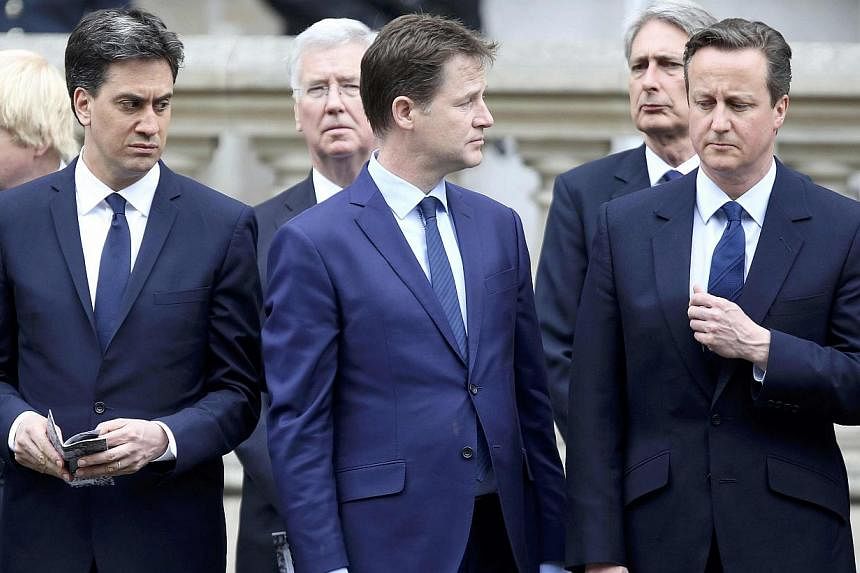BRUSSELS (AFP) - Europe wakes up to the cold certainty of an unprecedented British referendum on EU membership after David Cameron's election win, with two years of tough negotiations ahead to prevent a so-called "Brexit".
Work was to start quickly at the European Union's headquarters in Brussels after Cameron, whose Conservatives secured a surprise majority, confirmed his intention to let Britons vote in 2017 whether to stay in or leave.
The EU said it was ready for talks with Cameron on the reforms that he has demanded, but stressed that its red lines on the bloc's four key principles such as people's freedom of movement were "non-negotiable".
"They are non-negotiable because they are the essence of the EU," said Margaritis Schinas, a spokesman for European Commission chief Jean-Claude Juncker, adding that Juncker was ready to meet Cameron soon.
EU President Donald Tusk skirted around the issue but urged Britain to stay.
"I count on the new British government making the case for the United Kingdom's continued membership of the European Union. In that I stand ready to help," he said in a statement.
'GETTING REAL'
Televisions in Brussels were tuned in to Cameron's Downing Street victory speech after an election result that ends five years of coalition with the europhile Liberal Democrats.
While it concentrated on domestic issues he stressed that he would live up to his pledge to hold an in-out referendum "on our future in Europe."
Cameron has vowed to renegotiate London's relationship with Brussels and then go to the electorate, saying he wants Britain to remain in a reformed EU.
His demands have however put him at odds with many other European leaders including German Chancellor Angela Merkel, the continent's power-broker.
Many in Brussels had been hoping Cameron's Labour rival Ed Miliband would win, given that Miliband, who resigned Friday following his defeat, had ruled out an EU referendum.
"The British are wrong if they think their partners are ready to pay a heavy price to keep them in, especially if that price deprives the whole European project of any meaning," one European diplomat told AFP in Brussels.
The British election result is the starting gun for bruising negotiations over the coming two years, beginning with a European summit in June at which Cameron is likely to set out the reforms he wants.
Previous summits have seen Cameron isolated and red-faced as he pushed his agenda, but analysts say this time it may be different.
Mats Persson, director of the Open Europe think-tank, said that after months of "posturing" Europe would now take the referendum seriously because it was a "new event, we have never seen something like that before. It's huge event for the EU."
"It's now getting real for people," Persson told AFP.
The mood music from Brussels has been more melodious in recent weeks, with Juncker last week opening the door to minor changes to the EU's treaties, even if he ruled out major alterations.
BREXIT RISK REDUCED?
The sheer scale of the Conservative victory could increase Cameron's negotiating power, analysts and officials said.
The failure of Nigel Farage's eurosceptic UK Independence Party to win more than one seat was a particular boost to Cameron, meaning that he may not have to pander so much to the anti-EU wing of his own Conservative Party.
"The risk of Brexit is strongly reduced today because Cameron has just received a full mandate and his position in his party has been strengthened," a senior European diplomat in Brussels told AFP.
Jan Techau, director of the Carnegie Europe think-tank said Cameron "could now be a strong leader of his own party, which is key for the coming nasty Brexit debate.
"But he needs to come out clearly with what he wants from Europe," Techau told AFP.
The referendum was now "winnable", a top EU official told AFP.
"We have to wait to see what he wants to negotiate. We certainly have work to do," the official said, adding: "I think that will start pretty quickly." Another Brussels source said that "if we have to have a package of adjustments to the four freedoms, give him them".

